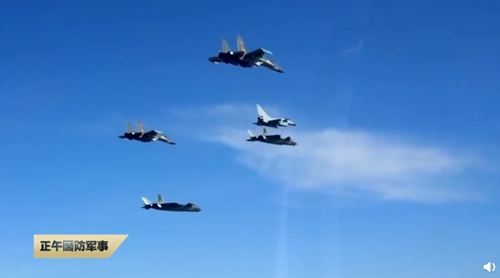
The "three musketeers of the sky" - the J-20, J-16 and J-10C - fly in formation in a real-combat scenario training session. Photo: Screenshot from China Central Television
China's most advanced J-20 stealth fighter jets assigned to an ace unit have been conducting real-combat scenario training together with powerful J-16 and agile J-10C jets, the People's Liberation Army (PLA) Air Force revealed, as a Chinese expert said Monday the combination can conjure a kaleidoscope of tactics to safeguard the country.
In a video released Sunday that celebrates the upcoming Spring Festival, the PLA Air Force showed the first scenes of J-20 fighter jets of the Wang Hai Air Group conducting real-combat scenario training.
This is an indication that the J-20 jets are making smooth progress in the air force, as their service has entered a new stage of comprehensive combat capability, military experts said.
The video also showed for the first time the J-20, J-16 and J-10C, dubbed the "three musketeers of the sky," taking off and conducting real-combat scenario training together. Two J-20s, two J-16s and one J-10C formed a combat formation, according to the video.
The combination of one J-20, one J-16 and one J-10C was tested in 2018, China Central Television (CCTV) reported then.
Air defense expert Fu Qianshao told the Global Times on Monday that the air force has been exploring tactics with the J-20 and other fighter jets in previous mock competitive training and has gained some experience in acquiring air superiority, land attack and sea attack.
While the J-20 is more advanced than the J-16 and J-10C, they share advanced technologies like avionics and active electronically scanned array radars, according to Fu.
The J-16, the least stealthy of the three, can lead an attack and openly use radar to detect targets and attract enemy attention, while the stealthy J-20s can lurk nearby and launch surprise missile attacks when hostile targets engage the J-16, Fu said, noting that the J-10C, when equipped with the domestically developed thrust vector control engine, will excel at close-quarters dogfights thanks to super maneuverability.
Another tactic is to first have the J-20 destroy hostile strategic hubs, including early warning aircraft and aerial tankers, using their stealth capability, and then the heavily loaded J-16 can strike enemy ground forces including mobile radar stations as the J-10C takes over air supremacy, experts told the Global Times.
The J-20 has a kaleidoscope of tactics to fulfill their missions and more mock combat exercises should be conducted, Fu said, noting he also expects electronic warfare aircraft to accompany the J-20.
The J-20 made its first test flight in 2011, its public debut at Airshow China 2016 and entered military service in 2017.




